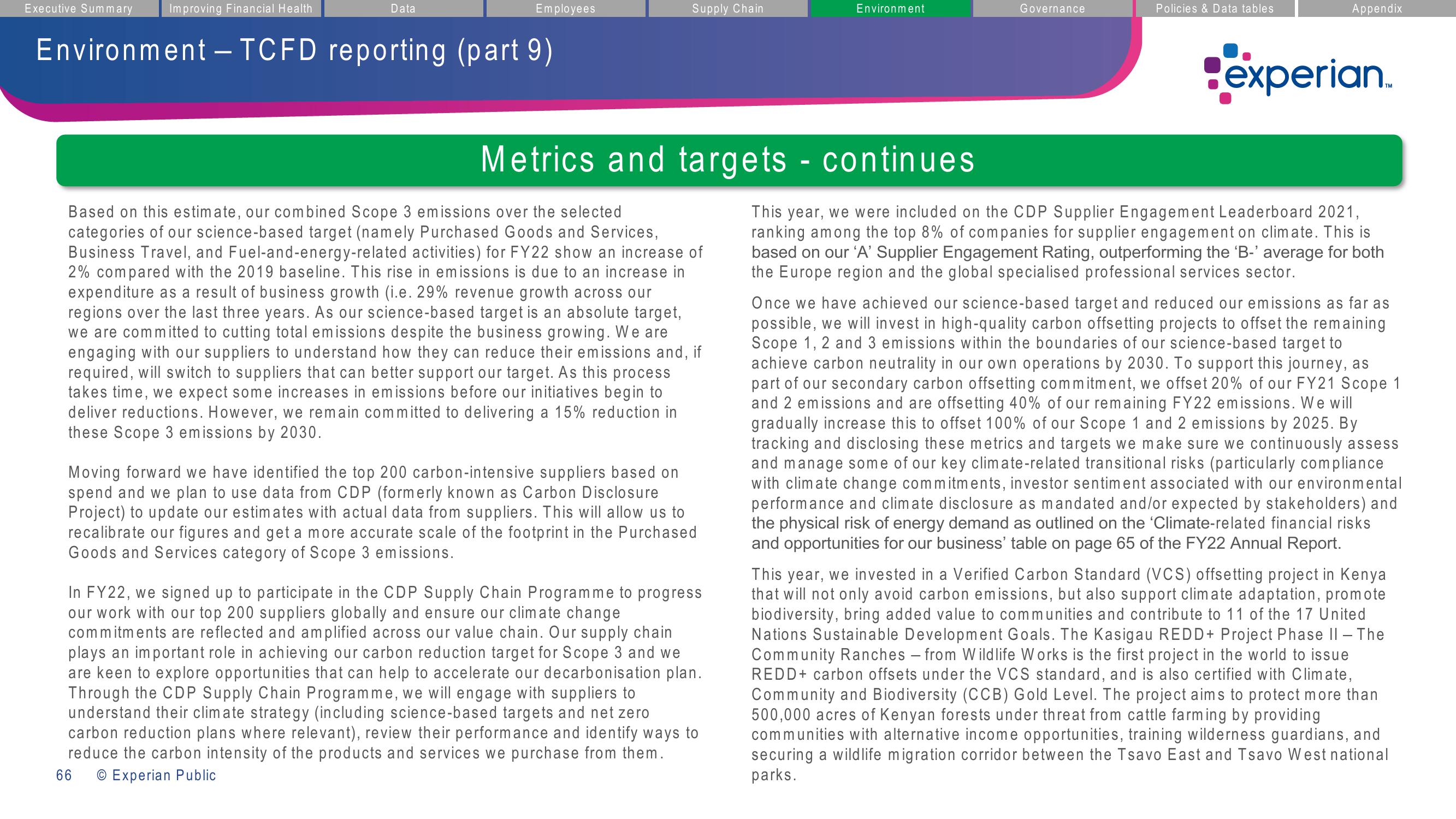Experian ESG Presentation Deck
Executive Summary
Environment - TCFD reporting (part 9)
Improving Financial Health
Data
Employees
66
Supply Chain
Based on this estimate, our combined Scope 3 emissions over the selected
categories of our science-based target (namely Purchased Goods and Services,
Business Travel, and Fuel-and-energy-related activities) for FY22 show an increase of
2% compared with the 2019 baseline. This rise in emissions is due to an increase in
expenditure as a result of business growth (i.e. 29% revenue growth across our
regions over the last three years. As our science-based target is an absolute target,
we are committed to cutting total emissions despite the business growing. We are
engaging with our suppliers to understand how they can reduce their emissions and, if
required, will switch to suppliers that can better support our target. As this process
takes time, we expect some increases in emissions before our initiatives begin to
deliver reductions. However, we remain committed to delivering a 15% reduction in
these Scope 3 emissions by 2030.
Metrics and targets - continues
Moving forward we have identified the top 200 carbon-intensive suppliers based on
spend and we plan to use data from CDP (formerly known as Carbon Disclosure
Project) to update our estimates with actual data from suppliers. This will allow us to
recalibrate our figures and get a more accurate scale of the footprint in the Purchased
Goods and Services category of Scope 3 emissions.
In FY22, we signed up to participate in the CDP Supply Chain Programme to progress
our work with our top 200 suppliers globally and ensure our climate change
commitments are reflected and amplified across our value chain. Our supply chain
plays an important role in achieving our carbon reduction target for Scope 3 and we
are keen to explore opportunities that can help to accelerate our decarbonisation plan.
Through the CDP Supply Chain Programme, we will engage with suppliers to
understand their climate strategy (including science-based targets and net zero
carbon reduction plans where relevant), review their performance and identify ways to
reduce the carbon intensity of the products and services we purchase from them.
O Experian Public
Environment
Governance
Policies & Data tables
Appendix
Bexperian.
This year, we were included on the CDP Supplier Engagement Leaderboard 2021,
ranking among the top 8% of companies for supplier engagement on climate. This is
based on our 'A' Supplier Engagement Rating, outperforming the 'B-' average for both
the Europe region and the global specialised professional services sector.
Once we have achieved our science-based target and reduced our emissions as far as
possible, we will invest in high-quality carbon offsetting projects to offset the remaining
Scope 1, 2 and 3 emissions within the boundaries of our science-based target to
achieve carbon neutrality in our own operations by 2030. To support this journey, as
part of our secondary carbon offsetting commitment, we offset 20% of our FY21 Scope 1
and 2 emissions and are offsetting 40% of our remaining FY22 emissions. We will
gradually increase this to offset 100% of our Scope 1 and 2 emissions by 2025. By
tracking and disclosing these metrics and targets we make sure we continuously assess
and manage some of our key climate-related transitional risks (particularly compliance
with climate change commitments, investor sentiment associated with our environmental
performance and climate disclosure as mandated and/or expected by stakeholders) and
the physical risk of energy demand as outlined on the 'Climate-related financial risks
and opportunities for our business' table on page 65 of the FY22 Annual Report.
This year, we invested in a Verified Carbon Standard (VCS) offsetting project in Kenya
that will not only avoid carbon emissions, but also support climate adaptation, promote
biodiversity, bring added value to communities and contribute to 11 of the 17 United
Nations Sustainable Development Goals. The Kasigau REDD+ Project Phase II - The
Community Ranches - from Wildlife Works is the first project in the world to issue
REDD+ carbon offsets under the VCS standard, and is also certified with Climate,
Community and Biodiversity (CCB) Gold Level. The project aims to protect more than
500,000 acres of Kenyan forests under threat from cattle farming by providing
communities with alternative income opportunities, training wilderness guardians, and
securing a wildlife migration corridor between the Tsavo East and Tsavo West national
parks.View entire presentation